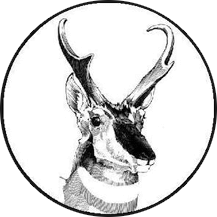About the Committee
Chair
- Melissa I. Pardi (mel.pardi@gmail.com)
Members
|
|
|
History and Mission
President W. H. Burt established the Honoraria Committee in 1953 as the Committee on Honoraria for Graduate Students. Its name was shortened to ‘Honoraria Committee’ in 1968. In 2012, awarding of travel awards was added to the committee’s function and the name was changed to the ‘Honoraria and Travel Awards Committee'; and in 2020, Care Assistance Travel Awards were added. Thus, the committee has several missions. The first is to select graduate students to be honored for their research in mammalogy. At present four named awards, recognizing key historical contributors to the Society and its students, are given: the Anna M. Jackson Award, the A. Brazier Howell Award, the Elmer C. Birney Award, and the Annie M. Alexander Award. The Alexander Award is for master's students only, while either master's or doctoral students are eligible for the other three awards. Graduate Student Honoraria recipients are awarded a stipend to attend the Annual Meeting, where they have the honor of presenting their papers at the opening Plenary Session. Second, the committee selects recipients of up to two Undergraduate Student Honoraria. Recipients of the undergraduate awards are awarded a stipend to attend the meetings where they will give either an oral or poster presentation during regular concurrent technical sessions. Finally, the committee gives Travel Awards to help offset meeting travel costs to ASM members who are early in their professional careers, and to student members at any rank, and to support those needing care assistance to attend the meeting. The role of the committee is to advertise these awards widely, to receive and review application materials, and to select awardees.
Responsibilities
The duty of this committee is to select graduate students and undergraduates to be honored for their research in mammalogy and to provide travel awards to early career mammalogists, to those needing support for dependents when traveling, and to students at any rank by advertising the awards, receiving and reviewing application material, and selecting awardees.
Currently awards are advertised in the Journal of Mammalogy, on the ASM website, in ASM social media, and on the ASM Google Group.
Applications for Honoraria are accepted annually from 15 January to 15 February, recipients are selected by early March.
Applications for Travel Awards are accepted starting early in the calendar year through 15 March, with the aim of notifying recipients before the close of regular registration for the annual meeting.
Names of award recipients must be provided to the Program Committee by the end of March to ensure that the information is printed in the program.
The Chair should ensure that a new announcement for each award type is submitted to the Editor of the Journal of Mammalogy and posted on the website. The initial change to Journal of Mammalogy must be submitted by 1 August; thereafter, the announcement appears without special submission.
Streaming Presentations
ASM Members can log into the Business Office site and stream presentations from past winners!
The Awards
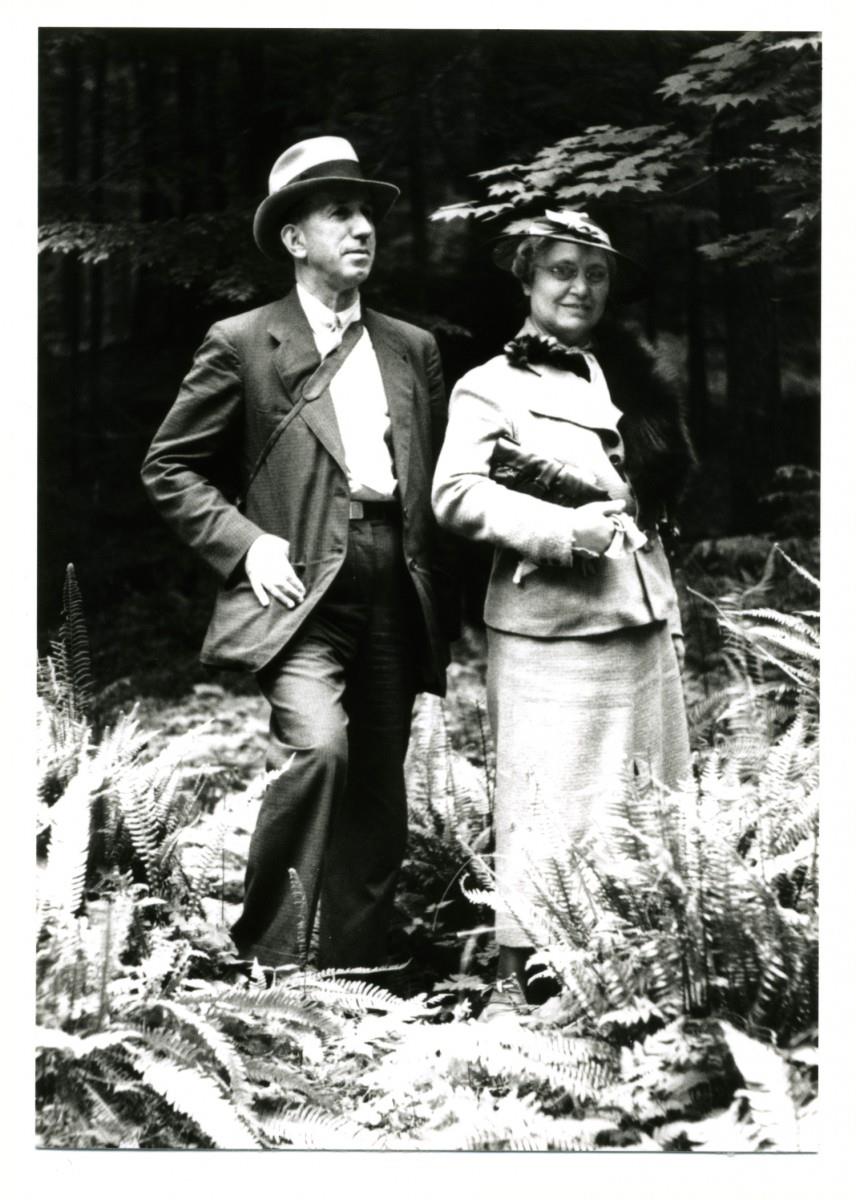 The Anna M. Jackson Award is named in honor of Anna M. Jackson, one of the 16 female Charter Members of ASM (out of 435 total) when it was founded in 1919. Like many of her female contemporaries, Anna's involvement with the world beyond her doorstep was through her husband, Hartley (pictured here with her), who is considered the person most responsible for the founding of ASM. Anna did most of the record-keeping and typing and handled correspondence and other papers of the Society during its formative period, when Hartley served as ASM secretary. Anna also accompanied Hartley on field expeditions, where she assisted with botanical collections, and was present at the organizational meeting of ASM. The Jackson Award was first given by the Society in 1970.
The Anna M. Jackson Award is named in honor of Anna M. Jackson, one of the 16 female Charter Members of ASM (out of 435 total) when it was founded in 1919. Like many of her female contemporaries, Anna's involvement with the world beyond her doorstep was through her husband, Hartley (pictured here with her), who is considered the person most responsible for the founding of ASM. Anna did most of the record-keeping and typing and handled correspondence and other papers of the Society during its formative period, when Hartley served as ASM secretary. Anna also accompanied Hartley on field expeditions, where she assisted with botanical collections, and was present at the organizational meeting of ASM. The Jackson Award was first given by the Society in 1970.
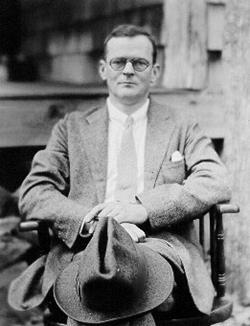 The A. Brazier Howell Award recognizes A. Brazier Howell, a charter member of the Society who also served as President, Vice President, Journal Editor and Corresponding Secretary. Like many early mammalogists, he was first trained as an ornithologist, but soon saw the error in his ways and contributed to many areas of mammalogy, notably in anatomy and systematics. He was also a talented artist, musician and wood worker. In 1959, he provided the endowment that is the source of this award, which was first given in 1961.
The A. Brazier Howell Award recognizes A. Brazier Howell, a charter member of the Society who also served as President, Vice President, Journal Editor and Corresponding Secretary. Like many early mammalogists, he was first trained as an ornithologist, but soon saw the error in his ways and contributed to many areas of mammalogy, notably in anatomy and systematics. He was also a talented artist, musician and wood worker. In 1959, he provided the endowment that is the source of this award, which was first given in 1961.
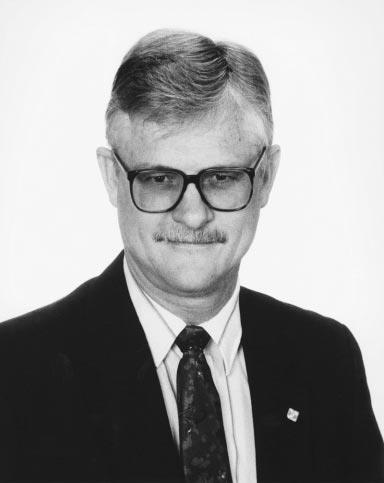 The Elmer C. Birney Award (formerly the ASM Award) is the Society's oldest student honorarium, established in 1951. In 2001, it was re-named in honor of Elmer Birney, a long-time member and past President of ASM. Dr. Birney was a professor at the University of Minnesota for 40 years and served as curator of mammals of the Bell Museum of Natural History, where he is perhaps best known for his work on the physiology and ecology of grassland rodents. He served the Society in many ways, including as Managing and Journal Editor for the Journal of Mammalogy and its Special Publications. One of the hallmarks of his service was his long-standing commitment to graduate education, as an advisor, mentor, and teacher, as well as increasing participation of young people in the Society.
The Elmer C. Birney Award (formerly the ASM Award) is the Society's oldest student honorarium, established in 1951. In 2001, it was re-named in honor of Elmer Birney, a long-time member and past President of ASM. Dr. Birney was a professor at the University of Minnesota for 40 years and served as curator of mammals of the Bell Museum of Natural History, where he is perhaps best known for his work on the physiology and ecology of grassland rodents. He served the Society in many ways, including as Managing and Journal Editor for the Journal of Mammalogy and its Special Publications. One of the hallmarks of his service was his long-standing commitment to graduate education, as an advisor, mentor, and teacher, as well as increasing participation of young people in the Society.
 The Annie M. Alexander Award was established in 2012 to recognize the contributions of master's-level students to research in mammalogy. Its namesake is Annie Alexander, an intrepid naturalist, field biologist and paleontologist who was responsible for the establishment and early success of the University of California’s Museum of Vertebrate Zoology. Along with Louise Kellogg, her companion of 40 years, she made numerous collecting expeditions throughout California and western North America. She was a Charter Member of ASM and its first female Life Member, and actively promoted increasing opportunities for female graduate students in field biology and collections-based research.
The Annie M. Alexander Award was established in 2012 to recognize the contributions of master's-level students to research in mammalogy. Its namesake is Annie Alexander, an intrepid naturalist, field biologist and paleontologist who was responsible for the establishment and early success of the University of California’s Museum of Vertebrate Zoology. Along with Louise Kellogg, her companion of 40 years, she made numerous collecting expeditions throughout California and western North America. She was a Charter Member of ASM and its first female Life Member, and actively promoted increasing opportunities for female graduate students in field biology and collections-based research.
Photo credits: Anna Jackson (ASM Archives), A. Brazier Howell (pwrc.usgs.gov), Elmer Birney (ASM Archives), Annie Alexander (University of California Museum of Paleontology)
Undergraduate Honoraria: The American Society of Mammalogists supports and encourages undergraduate students to participate in research and engage in the annual meeting. This award is open to all undergraduate student members of ASM currently enrolled in an undergraduate program, or who graduated in the just-completed fall or winter term, and who have participated in mammal research.
Travel Awards: ASM recognizes the value and importance of participation in the Annual Meeting as a way to become connected to the Society and its members, to forge professional relationships and collaborations, and to take advantage of the Annual Meeting as a mechanism for communicating highest-caliber research results. The Society offers nominal Travel Awards to help offset costs for students and early-career (within 5 years of their terminal degree) members of ASM to participate in the Annual Meeting.
Care Assistance Award: This award is intended to provide financial support for active ASM members whose responsibilities for care of dependents or need for assistance themselves would limit their ability to attend and present at the Annual Meeting.
Recipients
Recipients of the 2024 Graduate Honoraria
|
Image
 |
2024 Annie M. Alexander Award – Hailey Jacobson grew up in Missoula, Montana, and cherished her summers at Flathead Lake, where she captured insects, swam all day, and fostered her deep passion for nature and wildlife. In 2018 she received a B.S. in Biology with an emphasis in Ecology and Evolutionary Biology from Brown University. After graduating, Hailey worked as a technician and volunteer for a wide range of projects including research on aquifer and river stoneflies, greater sage grouse, and golden-mantled ground squirrels. In May 2024, Hailey finished her M.S. in Wildlife Conservation Ecology in the Department of Fish, Wildlife, and Conservation Ecology at New Mexico State University (NMSU) under the guidance of Dr. Jennifer Frey. For her thesis research, Hailey conducted extensive field research in the Organ Mountains of southern New Mexico studying extirpation, habitat selection, and distribution of the endemic Organ Mountains Colorado chipmunk via occupancy models. During her time at NMSU, Hailey also worked on a project studying the apparent extirpation of the state Endangered Peñasco least chipmunk in the southern Sacramento Mountains, co-mentored an undergraduate student working on a project studying ringtail occupancy, maintained camera grids in three mountain ranges, and served as a teaching assistant for multiple undergraduate classes. After graduating with her Masters, Hailey plans to work for a state or federal government agency to facilitate the conservation of wildlife |
|
2024 Anna M. Jackson Award – Ellen Dymit. Growing up in Minnesota, Ellen Dymit’s love of wilderness was born when she first heard wild wolves howl. By a delightful twist of fate, her PhD in Wildlife Science with Dr. Taal Levi at Oregon State University is centered largely on the foraging ecology of coastal wolves in several National Parks across the Gulf of Alaska. Broadly, Ellen uses non-invasive sampling methods including fecal DNA analyses, camera trapping, and aerial surveys to revise our natural history understanding of elusive carnivores in highly remote locations. Her dissertation research has involved 14 months of fieldwork and is split between two very distinct ecosystems. In the Maya Biosphere Reserve of Guatemala, Ellen is working collaboratively with the Wildlife Conservation Society and World Wildlife Fund to investigate the food web interactions among jaguars, pumas, ocelots, and margay. For this project, Ellen has enlisted scat detection dogs to sniff through the ruins of Tikal and has climbed in the rainforest canopy to set camera traps for monitoring arboreal wildlife. In the National Parks of coastal Alaska, Ellen is engaged with multiple federal and state agencies in research pursuits that transcend the marine-terrestrial interface, with major players including wolves, brown bears, sea otters, and salmon. Ellen’s dissertation also has modules featuring coastal lynx, red foxes, coyotes, marine invertebrates, and scarlet macaws. In addition to receiving the Anna M. Jackson Award, Ellen is an NSF Graduate Research Fellow, ARCS Foundation Scholar, and Fulbright Program (Norway) alumna. She completed her Bachelor of Science in Environmental Science and Biology at Emory University in Atlanta, Georgia. Ellen hopes to continue expanding her collaborative relationships and deepening her scientific inquiry in both Alaska and Central America. She ultimately aspires to help found long-term monitoring initiatives and field genomics laboratories in these systems as the head of a research program. |
Image
 |
|
Image
 |
2024 A. Brazier Howell Award – Jesse Laney is a community ecologist broadly interested in quantifying patterns of biodiversity and understanding how they correspond to environmental gradients across multiple spatiotemporal scales. He received his B.S. in Wildlife Science at Oregon State University and is currently a Ph.D. Candidate in the Department of Integrative Biology at Oregon State University, advised by Dr. Rebecca Terry. Jesse’s research investigates how habitats, climate, resources, and community structure influence the ecological niches of both mammals and birds. During his dissertation, he studied spatial and temporal patterns of community diversity and isotopic niche breadth in small mammals along the Steens Mountain-Alvord Desert elevation gradient in the northern Great Basin by relocating and resurveying historical sites dating back over a century. Jesse and colleagues benchmarked small mammal diversity in the system by collecting hundreds of biological specimens using standardized methods that may be used for repeated monitoring in the future. His graduate research also focusses on quantifying macroecological patterns across multiple axes of biodiversity. Jesse studied the taxonomic, phylogenetic, and functional diversity of North America’s songbirds in relation to topography and environmental gradient across the continent. Jesse has been a member of the American Society of Mammalogists since 2019 and has presented research supported by an ASM Grant in Aid of Research at two previous meetings. Jesse is dedicated to teaching the next generation of science professionals and has mentored dozens of students in the field, laboratory, and museum. He serves on the ASM IDEA committee where he is working with colleagues to promote and enhance safe practices in scientific field work in mammalogy and beyond. |
|
2024 Elmer C. Birney Award – Julia Owen is a PhD candidate at the University of California, Davis, advised by Ben Sacks in the Mammalian Ecology and Conservation Unit. Her research interests center on using genetic and genomic tools to contribute to wildlife conservation and management. In the early stages of her Ph.D., Julia conducted a study using noninvasive fecal DNA to estimate black bear density in the Lake Tahoe Basin. More recently, Julia’s focus has shifted toward using genomic methods to understand how genomes are influenced by evolutionary history. Julia is am fascinated by this approach to studying wildlife as it allows researchers to bridge the gap between a population’s history and it’s present-day characteristics, which can be an important component of developing an effective conservation strategy. Julia is currently conducting research aimed at investigating the evolutionary history of the Channel Islands spotted skunk. This very attractive carnivore inhabits both Santa Rosa Island and Santa Cruz Island where it lives alongside another carnivore – the island fox. Her goal is to use genomic tools to investigate the timing of skunk arrival on the islands and explore how their historical population dynamics have shaped patterns within present-day genomes. Beyond research, Julia has dedicated part of her time in graduate school to being a mentor within her community of first-generation and underrepresented students in STEM. Julia is deeply grateful to the American Society of Mammalogists for their steadfast support of emerging mammalogists and for honoring her with the Elmer C. Birney Award. She looks forward to connecting with fellow mammalogists at the upcoming meeting in Boulder this summer! |
Image
 |
|
Image
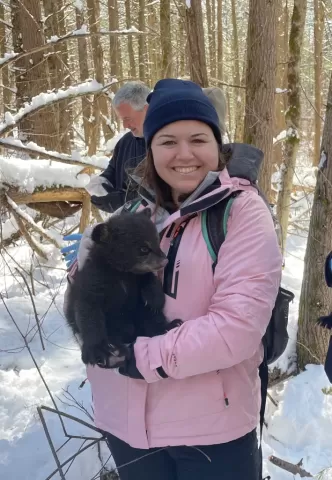 |
Annie M. Alexander Award — Kathryn Bischoff is a PhD student at the University of Connecticut in the Natural Resources and Environment Department. She received her B.S. in Biology from Colby-Sawyer College, where she studied the prevalence of pathogens and pests in honeybees. She was awarded a USDA National Needs Fellowship and completed her M.S. in Natural Resources at the University of Connecticut. Her thesis focused on how an introduced competitor and habitat characteristics influence population dynamics of the imperiled New England cottontail. Her research involves using spatial and statistical analyses, including occupancy and abundance models, to compare species-habitat relationships. The overall goal of her research was to better understand how to manage for New England cottontail in a landscape prevalent with the introduced eastern cottontail. She recently started a PhD at the University of Connecticut, where she will create species distribution models for several species of conservation concern in Connecticut. Her work will combine ecological data with social data to map priority areas for conservation for the Connecticut Wildlife Action Plan. She is excited to work in applied conservation research, and plans to pursue a career in endangered species policy at the federal level and then work as a professor. Her favorite wildlife experience during her graduate studies has been holding month-old black bear cubs while state agency employees attached a radio collar to the sow. |
| Anna M. Jackson Award — Rachel Stein grew up in Omaha, Nebraska, and graduated from the University of Nebraska at Omaha with a B.S. in Biology. She studied Natural Resources as an M.S. student at the University of Idaho’s McCall Outdoor Science School where she developed curriculum focused on connecting students to science and place through acoustic ecology. In May 2023, Rachel graduated with her Ph.D. in Natural Resources from the University of Idaho. Her dissertation research focused on how properties of habitat influence access to sensory information, particularly visual information, and how individuals select habitat in response. Rachel worked extensively on methods of measuring viewsheds (i.e., visibility) using terrestrial lidar. Currently, she is working as a short-term postdoctoral researcher scaling up the method to assess viewsheds at a landscape-scale with drone and airborne lidar data. Rachel has a strong interest in education and outreach that she continued to pursue during her doctoral studies, as both a teaching assistant and instructor of record for numerous wildlife and ecology courses at the University of Idaho. She also mentored multiple undergraduate researchers. In addition to the Anna M. Jackson Award, Rachel received a Grant-in-Aid from ASM in 2020. Her research has also been funded by the NASA Idaho Space Grant Consortium, Phi Kappa Phi, the Idaho Chapter of the Wildlife Society, and grants from the University of Idaho. |
Image
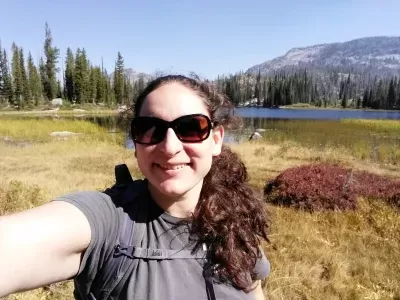 |
|
Image
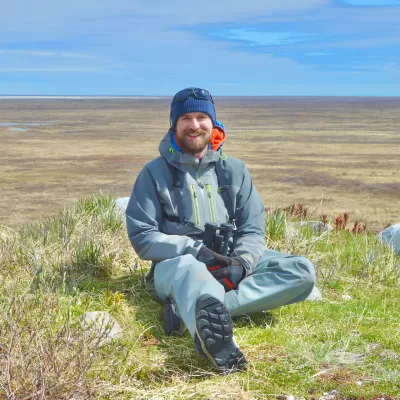 |
A. Brazier Howell Award — Sean Johnson-Bice is currently a PhD candidate at the University of Manitoba under the supervision of Dr. Jim Roth. His current research focuses on two major aspects: understanding how predators help contribute to landscape heterogeneity and ecosystem function via a variety of mechanisms, and evaluating the population dynamics and trophic interactions of Arctic tundra predators – namely, Arctic and red foxes – and their prey. This work is part of the long-term research project, the Churchill Fox Project, led by Jim Roth that is generally focused on studying food web dynamics, and how these dynamics are affected by climate change, at the tundra-taiga interface along the western coastline of Hudson Bay near Churchill, Manitoba, Canada. Sean has broad research interests, including understanding how human activity affects mammalian behavior and predator-prey dynamics, studying the ecosystem engineering roles of mammals and how they affect other species, and evaluating drivers of animal population dynamics and trends in a changing climate. He is also interested in using modern analytical techniques and remote sensing data/technology towards answering both fundamental and applied ecological questions within these research areas. Sean fostered a passion for the outdoors, wild places, and wildlife through childhood camping trips and by working seasonal technician jobs in places like Hawaii, the mountains near Santa Fe, New Mexico, the Florida Keys, and the Northwoods of Minnesota, where he worked for several years as part of the long-term Voyageurs Wolf Project (and still collaborates with today). Sean received his B.Sc. from the University of Wisconsin-Madison, and his M.Sc. from the University of Minnesota Twin Cities. |
| Elmer C. Birney Award — Miranda Theriot is currently a PhD candidate in biology at the University of Oklahoma working with Dr. Hayley Lanier (also a Birney award recipient in 2008). For her research, Miranda uses museum specimens to assess mammalian responses to recent global change, with an emphasis on body-size shifts. Her dissertation focuses on drivers of morphological trends across space and time in mammals, including underlying shifts in population age structure, nutrient stress, and urbanization. The pursuit of these topics has led her work on a variety of species, including masked shrews, American martens, Canada lynx, eastern fox squirrels, and raccoons. Miranda has had the honor to conduct her research at two museums: The University of Alaska Museum and the Sam Noble Oklahoma Museum of Natural History. Building on a lifelong love of museums, Miranda aims to pursue a career that integrates specimen-based research, collections stewardship, and public |
Image
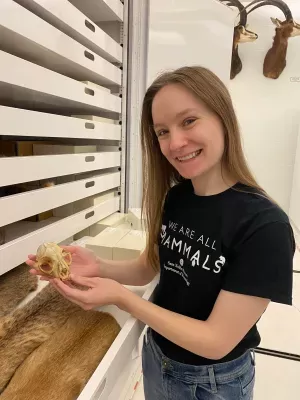 |
2023 Undergraduate Student Honoraria:
The American Society of Mammalogists supports and encourages undergraduate students to participate in research and engage in the annual meeting. The Undergraduate Student Honoraria program was established in 2000 to recognize the outstanding research accomplishments and potential for future success of its undergraduate members.
|
Image
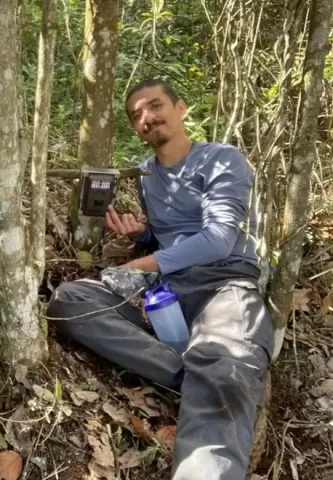 |
Since Esteban Restrepo-Cortés’ first year at Universidad CES in Colombia, he has been fascinated by mammals. His passion has led him to explore ecosystems in the neotropics from the Andean Páramos grasslands to the Colombian xerophytic forest, learn different field methods to study mammals, and help to teach mammalogy content in some undergraduate classes. For his honors’ thesis at Universidad CES, he researched the dietary ecology of the mountain lion (Puma concolor) in the northern Andes using scat analyses. Esteban is also invested in collections-based research and has involved himself with mammalian specimen preparation at both the Colecciones Biológicas de la Universidad CES and the Museum of Southwestern Biology at the University of New Mexico. At the University of New Mexico, he became interested in the research topics in Dr. Felisa Smith’s lab. There, under the mentorship of PhD candidate Jonathan Keller, Esteban is working on a project to identify harvest mouse (Reithrodontomys) species from 3D tooth shape and collecting ecomorphology data to characterize changes in ecology from the Pleistocene to the present. Studying these 3D dental data under the supervision of Jonathan and Dr. Felisa Smith, he is currently examining dental traits of the extant rodent Reithrodontomys to differentiate between three species present in the area surrounding the Hall’s Cave fossil site in Texas. Using these traits, he is identifying the fossils to determine whether climate change and biodiversity caused species turnover within Reithrodontomys over time or if individual species adapted. In his graduate research, he hopes to investigate the trophic dynamics between extinct and extant felids in the Americas to reconstruct how the ecology of American felids has changed over time. |
| Katherine Garrett is finishing up her bachelor’s degree in Zoology from the University of Wyoming in Laramie, WY and is anticipating graduating in Fall of 2023. She is interested in population ecology, conservation, animal behavior, disease management, and evolutionary biology. Growing up in the Black Hills National Forest allowed for her to foster an interest and deep appreciation for wildlife, specifically mammals, from a young age. Throughout high school and the start of college, her interest in research grew and led her to pursue undergrad research in multiple labs around campus including her current lab and research assistant positions. She is now a part of the Wyoming Research Scholars Program which has allowed her to join Dr. Jacob Goheen’s lab, studying the life history traits of Kenyan small mammals. In the future she hopes to pursue a career in academia and is currently applying for a wildlife internship in the Spring of 2024 and master’s program in ecology in the Fall of 2024. |
Image
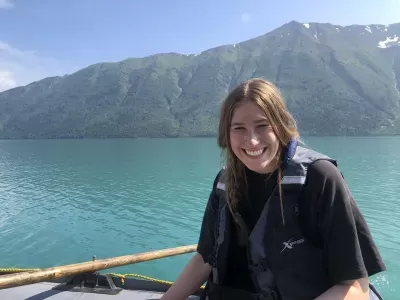 |
Anna M. Jackson Award
1970-1979
- 1970—Earl Zimmerman
- 1971—Donald Peden
- 1972—Kent Van De Graaf
- 1973—Kenyon Wagner
- 1974—Lynn Rogers
- 1975—Myrnal Hawes
- 1976—Leslie Carraway
- 1977—Paul Sherman
- 1978—Michael Bowers
- 1979—Daniel Vogt
1980-1989
- 1980—Frank Fish
- 1981—David Krause
- 1983—Tom Tomasi
- 1984—Kevin Murphy
- 1985—Robert Sullivan
- 1986—Paul Heideman
- 1987—Bradley Bergstrom
- 1988—Elizabeth Desy
- 1989—Ronald Debry
1990-1999
- 1990—Penny Reynolds
- 1991—James Reiger
- 1994—Tim Ginnett
- 1995—David Reed
- 1996—Paul Stapp
- 1997—Felicia Keesing
- 1998—Eric Schauber
- 1999—Jay Storz
2000-2009
- 2000—Christy McCain
- 2001—Christine Hice
- 2002—James Wilson
- 2003—Jacob Goheen
- 2004—Jessica Light
- 2005—Sacha Vignieri
- 2007—Karen Mabry
- 2008—Katherine Thorington
- 2009—Jennifer Smith
2010-2019
- 2010—Michael Dixon
- 2011—Julie Woodruff
- 2012—Lawrence "Mark" Elbroch
- 2013—Elizabeth Kierepka
- 2014—Johanna Varner
- 2015—Janna Willoughby
- 2016—Laurel Yohe
- 2017—Andrea Dechner-Sierra
- 2018—Erin Siracusa
- 2019—Katheryn Stanchak
2020+
- 2020—Addison Allen
- 2021—Ben Weins
- 2022—Flavio Augusto da Silva Coelho
- 2023—Rachel Stein
- 2024—Ellen Dymit
A. Brazier Howell Award
1956-1959
- 1956—Keith Justice
- 1957—Ormond Mitchell
- 1958—Eugene Fleharty
- 1959—John Stephens
1960-1969
- 1960—John Hall
- 1961—Robert Catlett
- 1962—David Rassmussen
- 1963—John Winkelmann
- 1964—Illar Muul
- 1965—Dieter Tzschentke
- 1966—RA Mead
- 1967—Leonard Brand
- 1968—Patricia Berger
- 1969—Theodore Fleming
1970-1979
- 1970—Bill Texera
- 1971—Ernest Christopher
- 1972—Peter Meserve
- 1973—James Joule
- 1974—Robert Rose
- 1975—Alan French
- 1976—Jack Cranford
- 1977—Frederick Jannett
- 1978—David Foltz
- 1979—Joyce Poole
1980-1989
- 1980—Steven Thompson
- 1981—Richard Ostfeld
- 1983—Duke Rogers
- 1984—Priscilla Tucker
- 1985—Kimberlyn Nelson
- 1986—Terry Derting
- 1987—Renee Rusler
- 1988—Paul Leberg
- 1989—Glennis Kaufman
1990-1999
- 1990—Craig Frank
- 1991—David Ribble
- 1993—Martin Main
- 1994—Dawn Kaufman
- 1995—Pamela Austin
- 1996—Scott Nunes
- 1997—Chris Conroy
- 1998—Joseph Jacquot
- 1999—Steve Cote
2000-2009
- 2000—Kathleen LoGuidice
- 2001—Linda Lise
- 2003—John Orrock
- 2004—Karen Nutt
- 2005—Jeffrey Moore
- 2007—Ana Paula Cutrera
- 2008—Gerald Carter
- 2009—Quinn Shurtliff
2010-2019
- 2010—Jonathan Reichard
- 2011—Tereza Jezkova
- 2012—Nathan S. Upham
- 2013—Jason Malaney
- 2014—John Doudna
- 2015—Melissa Pardi
- 2016—Kathryn Everson
- 2017—Talisin T. Hammond
- 2018—Casey Day
- 2019—Dakota Rowsey
2020+
- 2020—Lisa Walsh
- 2021—Carson Hedberg
- 2022—Allison Brehm
- 2023—Sean Johnson-Bice
- 2024—Jesse Laney
Elmer C. Birney Award (previously ASM Award)
1952-1959
- 1952—Wilbur Quay
- 1954—James Layne
- 1955—Phillip Youngman
- 1956—Herman Ogren
- 1957—John Rood
- 1958—Patricia DeCoursey
- 1959—William Adams
1960-1969
- 1960—Stephen Kaye
- 1961—Stanley Wecker
- 1962—Edwin Gould
- 1963—Aelita Pinter
- 1964—CC Rust
- 1965—Michael Smith
- 1966—Bill Texera
- 1967—James Brown
- 1968—John McManus
- 1969—Brock Fenton
1970-1979
- 1970—George McKay
- 1971—Ronald Olsen
- 1972—Donald Kaufman
- 1973—William Kilpatrick
- 1974—Charles Garten
- 1975—Michael Schum
- 1976—LorVel Shields
- 1977—Mark Hafner
- 1978—David Krohne
- 1979—Peter August
1980-1989
- 1980—Bruce Patterson
- 1981—Carol Rowsemitt
- 1982—Thomas Griffith
- 1983—Mark Lomolino
- 1984—John Gross
- 1985—Roger Everton
- 1986—Robert Swihart
- 1988—Hector Arita
- 1989—William Lawrence
1990-1999
- 1992—Eileen Lacey
- 1994—Rick Sweitzer
- 1995—Kathryn Gubista
- 1997—David McClellan
- 1998—Susan Lingle
- 1999—Stephen Mech
2000-2009
- 2000—Karen Stone
- 2001—Marjorie Matocq
- 2002—David Onorato
- 2003—Xiaoguang Zheng
- 2004—Kevin Rowe
- 2005—Trina Roberts
- 2007—Jackie Metheny
- 2008—Hayley Lanier
- 2009—Sean Neiswenter
2010-2019
- 2010—Thomas Giarla
- 2011—Christopher W. Habeck
- 2012—Eliecer E. Gutierrez
- 2013—Adam Ford
- 2014—Jennifer Schieltz
- 2015—Rachel Walsh
- 2016—Jeremy Chase Crawford
- 2017—Brett R. Jesmer
- 2018—Jesyka Meléndez-Rosa
- 2019—Brian Tanis
2020+
- 2020—Saeideh Esmaeili
- 2021—Miranda Crowell
- 2022—Douglas Njeri
- 2023—Miranda Theriot
- 2024—Julia Owen
Annie M. Alexander Award (Master's Students)
2010-2019
- 2013—Brooks Kohli
- 2015—Miranda Crowell
- 2016—Adriana Casillas
- 2017—Joshua M. Barry
- 2018—Emily M. Beasley
- 2019—Marie Martin
2020+
- 2020—Mariah Schlis-Elias
- 2021—Elizabeth Agpalo
- 2022—Olivia Chapman
- 2023—Kathryn Bischoff
- 2024—Hailey Jacobson
Undergraduate Student Honoraria
2001-2009
- 2001—Amy Bickham, Erin Jackson, Amy Turmelle
- 2002—Kathryn Connell, Luciana Santos, Christine Trunbull
- 2003—Emily Kaye Heward, Matthew John Michel
- 2004—Ryan Long, Beth Ross, Samantha Carpenter
- 2005—Brandi Coyner, C. Miguel Pinto, Melissa Fowler
- 2006—Maria Marchan, Nathan Upham
- 2007—Vagan Mushegyan, Samuel Skalak, Ali Raza
- 2008—Gabriela Gonzalez Olimon, Katelyn Schumacher
- 2009—Rebecca Kelly, Jennifer McCreight
2010-2019
- 2011—Emily Scobie, Reed Ojala-Barbour
- 2012—Aspen Reese
- 2013—Lauren Dorough, Dakota Rowsey
- 2014—Kimberly Conway, Andy Kulikowski
- 2015—Eric Green, Jonathan Keller
- 2017—Tara R. Preuett
- 2018—Connor Burgin, Sydney Stephens
- 2019—Robert Beers, Maya Juman
2020+
- 2020—Ananth Miller-Murthy, Sandy Slovikosky
- 2021—Victoria Aguilar, Austin Nash
- 2022—Alexis Proudman, Holly Nelson
- 2023—Esteban Restrepo-Cortés, Katherine Garrett
Reports
Award Info
The American Society of Mammalogists is committed to supporting students, early career professionals, and others needing travel support through a variety of programs. The relationships among these programs, including information on program aims, eligibility, and links to program webpages, is available here.
Who Can Apply
The competition is open to all graduate student members of the American Society of Mammalogists, regardless of nationality or current institutional affiliation. [To become a member of the Society visit the ASM membership page here.] Applicants must be master's or doctoral students (or have completed their degrees during the previous Fall term) when they apply. Only master’s students are eligible for the Annie M. Alexander Award, while either master's or doctoral students are eligible for the Anna M. Jackson, A. Brazier Howell, and Elmer C. Burney awards. Applicants must not have received a previous Graduate Honorarium from ASM, or a Shadle or ASM Fellowship (past winners of the Alexander Award may apply for other graduate honoraria for research on a different project at a different institution). However, recipients of ASM Grant-in-Aid of Research and other student research grants (Latin American Graduate Student Field Research Award, African Graduate Student Research Fund, James L. Patton Award, Student Science Policy Award) are eligible and encouraged to apply.
To diversify abstracts and support the maximum number of student attendees, recipients of the Shadle and ASM Fellowships are not eligible for Travel Awards in the same year as their award presentation. Students unsure of their eligibility are encouraged to contact the Chair of Honoraria and Travel Awards Committee well in advance of the application deadline.
Honoraria applications should be based on student research that is completed or nearly so, i.e., not proposed research. Collaborative work with multiple authors may be submitted, so long as the applicant has played the primary role in designing and conducting the research (the reference letter should address this issue). We seek to recognize students who have been primarily responsible for the design and/or conduct of the submitted research project (normally the student’s thesis or dissertation research). Any reference letter that does not clearly address the student's role in the research project and his/her ability to present the work successfully at the Annual Meeting will result in disqualification of the applicant. See detailed instructions for applying for Graduate Student Honoraria.
Members of the committee review and rank applications based on originality, quality, and presentation of the research and the advisor’s letter of support. Proposals with the highest overall ranking will be awarded, with the top-ranked master's application receiving the Alexander Award. Each Graduate Student Honorarium carries a stipend of $2000, which is intended to subsidize attendance at that year’s Annual Meeting.
Recipients
Honoraria recipients will have the distinct honor of presenting their research at the opening Plenary Session of the ASM Annual Meeting. These platform presentations will be 15 min in length (12 min for the oral presentation, 3 min for questions). Regardless of the outcome of the competition, applicants intending to present a paper at the Annual Meeting must submit the usual abstract and pre-registration materials to the local committee before the abstract deadline for the meeting.
Submit your application materials by 11:59 p.m. Eastern Time on 15 February on the applications page www.mammalsociety.org/applications. The advisor's letter must be submitted separately from the student's materials. Packets that do not meet the above requirements or are received after the deadline will not be considered. Applicants will be notified of the committee’s decision by 15 March. Please also email the committee chair (Dr. Mel Pardi mel.pardi@gmail.com) when you apply. Questions also should be directed to the committee chair Dr. Mel Pardi via email (mel.pardi@gmail.com).
Who Can Apply
The American Society of Mammalogists (ASM), a long-standing society organized to promote the study of mammals, encourages undergraduate students to apply for an Undergraduate Student Honorarium. The competition is open to all undergraduate student members of ASM. ASM has an international membership and encourages international students to join the Society and apply for its grants and awards programs. ASM student members currently enrolled in an undergraduate program, or who graduated in the just-completed fall or winter term, are eligible to apply. A student can receive an ASM Undergraduate Honorarium only once in her/his career, but are eligible for graduate honoraria when they enter a graduate program. Up to two awards of $1500 will be given each year, which are intended to subsidize attendance at the Annual Meeting in June. The committee will review applications and select award recipients on the basis of the originality and quality of research and the student's curriculum vitae. To become a member of the Society visit the ASM membership page at www.mammalsociety.org/membership.
Application Instructions
Applicants should submit a 300-500 word summary of the research project with 1 figure (or 1 table), a curriculum vitae, and a letter of support from their research advisor. Authors must submit PDF files; no other formats will be accepted. Applications must be submitted electronically to www.mammalsociety.org/applications by 11:59 p.m. Eastern Time on 15 February. Please also email the committee chair (Dr. Mel Pardi mel.pardi@gmail.com) when you apply. The advisor's letter must be submitted separately from the student's materials. Packets that do not meet the above requirements or are received after the deadline will not be considered. Applicants will be notified of the committee’s decision by 15 March.
Students receiving awards also must present an oral or poster presentation at the Annual Meeting. Applicants should also submit their abstract and pre-registration material to the local organizing committee before the regular abstract submission deadline for the meeting. For details about the next Annual Meeting, including abstract submission, see the ASM website here.
Who Can Apply
ASM recognizes the value and importance of participation in the Annual Meeting as a way to become connected to the Society and its members, to forge professional relationships and collaborations, and to take advantage of the Annual Meeting as a mechanism for communicating highest-caliber research results. The Society offers nominal Travel Awards to help offset costs for student and early-career members of ASM to participate in the Annual Meeting. The committee will acknowledge diverse career trajectories when considering early-career applicants. Recipients of ASM Grant-in-Aid of Research and other student research grants (Latin American Graduate Student Field Research Award, African Graduate Student Research Fund, James L. Patton Award, Student Science Policy Award) are encouraged to apply and share their ASM-supported results. Early-career recipients must give an oral presentation at the Annual Meeting, whereas students can present either a poster or a talk. Recipients must be both the primary author and the presenter. Selection is based on the quality and content of the submitted abstract and its potential to be of broad general interest to meeting participants.
To diversify abstracts and support the maximum number of student attendees, recipients of the Shadle and ASM Fellowships are not eligible for Travel Awards in the same year as their award presentation. Students unsure of their eligibility are encouraged to contact the Chair of Honoraria and Travel Awards Committee well in advance of the application deadline.
For travel assistance to the 2026 Annual Meeting, follow this link to access the webform and apply.
Who Can Apply
ASM recognizes that responsibilities for care of dependents can limit members’ ability to travel and attend the annual meeting. This award is intended to provide financial support for active ASM members to cover dependent care costs and allow them to present research, network, and/or attend workshops or symposia. Funds from this award must be used to support care assistance for dependents or the meeting attendee rather than general conference attendance costs, like registration or travel, for the applicant. Examples of approved uses for these funds include childcare or eldercare either at home or at the conference, hiring a temporary caregiver, and travel/host costs associated with bringing your dependent, a caregiver, or a helper to the conference. Recipients of the Care Assistance Award are eligible to receive a Travel Award or Honoraria in the same year.
For care assistance to the 2026 Annual Meeting, follow this link to access the webform and apply.
Questions should be directed to the committee chair Dr. Mel Pardi via email (mel.pardi@gmail.com).
Instructions
Detailed Instructions for Graduate Student Honoraria
Eligibility
The competition is open to all graduate student members of the American Society of Mammalogists, regardless of nationality or current institutional affiliation. [To become a member of the Society visit the ASM membership page here.]
Applicants must:
- Be master's or doctoral students (or have completed their degrees during the previous Fall term) when they apply. PhD students who have completed MA/MS degrees within the previous 18 months may apply for the Alexander Award using their Master’s research, but are not eligible to receive another graduate honorarium for work on a related project at the same institution.
- Not have received a previous Graduate Honorarium from ASM, or a Shadle or ASM Fellowship. However, recipients of ASM Grant-in-Aid of Research and other student research grants (Latin American Graduate Student Field Research Award, African Graduate Student Research Fund, James L. Patton Award, Student Science Policy Award) are eligible and encouraged to apply.
Students unsure of their eligibility are encouraged to contact the Chair of the Honoraria and Travel Awards Committee well in advance of the application deadline (mel.pardi@gmail.com)
Research Statement
Applicants should submit a summary of their graduate research not exceeding 1000 words (excluding Literature Cited, figures, or tables) with the following clearly labeled sections:
- Title
- Project Significance/Theoretical Context
- Methods
- Results
- Discussion/Interpretation.
- Literature Cited
Please include key figures/tables (3 items maximum) with concise captions (not to exceed 60 words max/caption) to support your results. The figure/table and caption both must fit on a single page. In-text citation format should follow that of the Journal of Mammalogy. Research currently under review for publication or ‘in press’ may be submitted.
Applicants should note that the Honoraria and Travel Awards Committee is composed of members from across different subdisciplines of mammalogy, and therefore are urged to write for a broad, scientifically literate audience and to avoid excessive jargon or technical terms. Collaborative work with multiple authors may be submitted, so long as the applicant has played the primary role in designing and conducting the research (the reference letter, see below, must address this issue).
Reference Letter
A letter should be addressed to the committee and be written by an individual familiar with the applicant's research, ideally, the research advisor/mentor or major professor. Beyond comments concerning the student’s general strengths, the letter must address the following:
- If the student will be prepared to present the research project in the Plenary Session of the upcoming Annual Meeting
- The student's role in designing and conducting the research, especially in the case of collaborative research.
We seek to recognize students who have been primarily responsible for the design and/or conduct of the submitted research project (normally the student’s thesis or dissertation research). Any letter that does not clearly address the two points stated above will result in disqualification of the applicant.
Evaluation criteria
Members of the Honoraria and Travel Awards Committee review and rank applications based on originality, quality, and presentation of the research and the advisor’s letter of support. The four proposals with the highest overall ranking will be awarded, with the highest ranked application from a master's applicant receiving the Alexander Award. Each award carries an Honorarium of $2000, intended to subsidize attendance at the Annual Meeting.
Detailed Instructions for Undergraduate Student Honoraria
Eligibility
The competition is open to all Undergraduate student members of the American Society of Mammalogists, regardless of nationality or current institutional affiliation. [To become a member of the Society visit the ASM membership page here.]
Applicants must:
- Be undergraduate students (or have completed their degrees during the previous Fall term) when they apply.
- Not have received a previous undergraduate Honorarium from ASM. However, recipients of ASM Grant-in-Aid of Research and other student research grants (Latin American Graduate Student Field Research Award, African Graduate Student Research Fund, James L. Patton Award, Student Science Policy Award) are eligible and encouraged to apply.
Students unsure of their eligibility are encouraged to contact the Chair of the Honoraria and Travel Awards Committee well in advance of the application deadline (mel.pardi@gmail.com)
Application Instructions
Applicants should submit a 300-500 word summary of the research project with 1 figure (or 1 table) and caption (caption not to exceed 60 words max), a curriculum vitae, and a letter of support from their research advisor. The figure/table and caption both must fit on a single page. In-text citation format should follow that of the Journal of Mammalogy. Research currently under review for publication or ‘in press’ may be submitted. Authors must submit PDF files; no other formats will be accepted. Applications must be submitted electronically to www.mammalsociety.org/applications by 11:59 p.m. Eastern Time on 15 February. Please also email the committee chair (Dr. Mel Pardi mel.pardi@gmail.com) when you apply. The advisor's letter must be submitted separately from the student's materials. Packets that do not meet the above requirements or are received after the deadline will not be considered. Applicants will be notified of the committee’s decision by 15 March.
Students receiving awards also must present an oral or poster presentation at the Annual Meeting. Applicants should also submit their abstract and pre-registration material to the local organizing committee before the regular abstract submission deadline for the meeting. For details about the next Annual Meeting, including abstract submission, see the ASM website here.
Questions should be directed to the committee chair Dr. Mel Pardi via email (mel.pardi@gmail.com).
Reference Letter
A letter should be addressed to the committee and be written by an individual familiar with the applicant's research, ideally, the research advisor/mentor or major professor. Beyond comments concerning the student’s general strengths, the letter must address the following:
- If the student will be prepared to present the research project during the upcoming Annual Meeting
- The student's role in the research especially in the case of collaborative research.
Evaluation criteria
Members of the Honoraria and Travel Awards Committee review and rank applications based on originality, quality, and presentation of the research and the advisor’s letter of support. The two proposals with the highest overall ranking will be awarded. Each award carries an Honorarium of $1500, intended to subsidize attendance at the Annual Meeting.
Submissions for Graduate and Undergraduate Honoraria
Submit your research statement (and ask your advisor to send his/her letter separately) in PDF format, electronically to www.mammalsociety.org/applications/ by 11:59 p.m. Eastern Time on 15 February. Please also email the chair of the committee [Dr. Mel Pardi via email (mel.pardi@gmail.com)] at the time that you submit your application. Applications that do not meet the above requirements or are received after the deadline will not be considered. Applicants will be notified of the committee's decision around 15 March.
Questions should be directed to the committee chair Dr. Mel Pardi via email (mel.pardi@gmail.com).
Graduate Student Honoraria recipients will present their research results at the Plenary Session of the ASM Annual Meeting. These platform presentations will be 15 min in length (12 min for the oral presentation, 3 min for questions). Regardless of the outcome of the competition, applicants should also submit their abstract and pre-registration material to the local organizing committee before the regular abstract submission deadline for the meeting. For details about the next meeting, including abstract submission, see the ASM website here.
Detailed Instructions for Travel Awards
Travel Awards are meant to help offset costs for students and early-career (within 5 years of their terminal degree) members of ASM to participate in the Annual Meeting. Recipients of ASM Grant-in-Aid of Research and other student research grants (Latin American Graduate Student Field Research Award, African Graduate Student Research Fund, James L. Patton Award, Student Science Policy Award) are encouraged to apply and share their ASM-supported results. Early-career recipients must give an oral presentation at the Annual Meeting, whereas students can present either a poster or a talk. Recipients must be both the primary author and the presenter.
Evaluation criteria
The committee uses a double-blind review process so students’ and coauthors’ names and institutions are not visible. Selection is based on the quality and content of the submitted abstract, its potential to be of broad general interest to meeting participants, and for following the formatting guidelines for the Abstracts available on the conference website.
Submissions for Travel Awards
Applicants will complete an online form through the submission portal and upload their abstract as a Word doc. Abstracts should follow the formatting requirements described on the conference website, however they should exclude author names and addresses (only include the title and body of the abstract). Contact information will be collected via the form.
Applications for the Travel Awards are accepted through an online portal specific to these awards. The link will for 2026 is available here.
Complete applications must be submitted to this site before 11:59 PM EST 15 March 2024 to be considered for one of these awards. No late applications will be accepted. Please note that applicants also will need to upload their abstracts to the conference website as a separate step. The number of awards per year will vary depending on available funds and selection of recipients will be done by the Honoraria and Travel Awards Committee.
Detailed Instructions for Care Assistance Awards
This award is intended to provide financial support for active ASM members whose responsibilities for care of dependents, or need for assistance themselves, would limit their ability to attend and present at the Annual Meeting. Receiving this award does not preclude current ASM members from applying to and receiving additional travel support from ASM. Funds from this award must be used to support dependent care rather than general conference attendance costs, like registration or travel, for the applicant. Examples of approved uses for these funds include childcare or eldercare either at home or at the conference, hiring a temporary caregiver, and travel/host costs associated with bringing your dependent, a caregiver, or a helper to the conference.
Applicants will complete an online form through the submission portal specific to this award. Applicants will be asked to upload a Word doc with an overview of their goals for attending the conference and either (or both) an abstract for an oral or poster presentation that will be given at the conference with an abstract following the guidelines available on the conference website or a description of their goals and/or reasons for attending the conference (e.g. networking, to attend a workshop, etc. instead of presenting). For both, applicants should omit including their name or institution on the Word doc.
Applications will be evaluated by a small internal committee and names of applicants will be omitted from the review process.
Applications for the Care Assistance Awards are accepted through an online portal specific to these awards that will be available during the application window. The link for 2026 is here.
